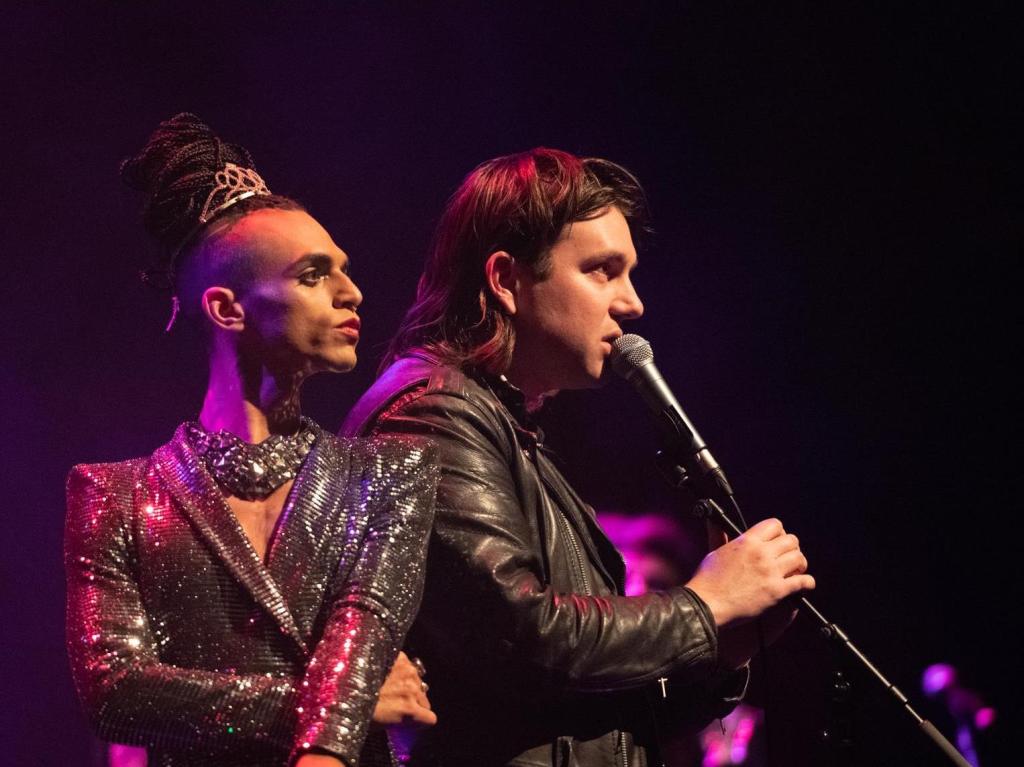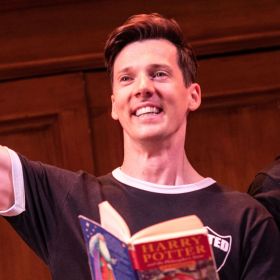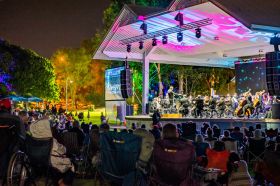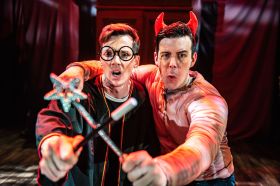Asis D’Orange and Alex Gow in Transformer at the Festival of Jewish Arts and Music. Image: Carmen Zammit.
The Festival of Jewish Arts and Music in Melbourne was a festival of contemporary music, art and thought, featuring performances by well-established and emerging performers and writers of Jewish and other heritage from Australia, the United States, and Israel.
The absolute highlight of the festival was the performance by the Melbourne-based ensemble YID!. YID! is a 22-piece ensemble that performs an avant-garde take on klezmer, the traditional music of eastern European Jews. Featuring Yiddish songs and beats with contemporary inflections, YID!’s mesmerising jazz fusion, with its spiritual and political overtones, enraptured the audience. With a smorgasbord of instruments, YID! created a raucous symphony that embodied ‘wild rapture’, a leitmotif in the Yiddish aphorisms that punctuated the music.
The George Dreyfus Quartet celebrated the music of Melbourne-based classical composer and cultural doyen George Dreyfus, whose contributions to classical music in Australia have won numerous accolades.
Deborah Conway and Willy Zygier, veterans of the festival’s earlier iteration, Shir Madness, performed beautiful songs whose lyrics resonated with messages of hope and rebellion against hate. Their standout song, Too Loud, delivered a powerful punch in the gut.
Transformer, a tribute to American musician and rock icon Lou Reed by the festival’s singers, was a celebration of counter-culture and experimentation, and the festival’s principal event on the theme of ‘walking on the wild side’, an allusion to Reed’s most popular song. Other events at the festival featured an array of brilliant bands and singers – too numerous to list here – whose performances spanned the whole day.
Gideon Obarzanek’s Circle Dance was an eccentric but invigorating dance piece that was performed by a group of very talented young people from the Yellow Wheel dance company in Melbourne. Inspired by an Israeli folk dance, this was an energetic piece that required dancers to physically exhaust themselves by surrendering to the pace of the choreography.
Diversity in gender and sexuality was amply represented at the festival, and there were many interesting explorations of the intersections between art, identity and performance. Performances by Israel Aloni and Asis D’Orange focalised the body in the process of meaning-making – provoking viewers to contemplate how the gendered body becomes a site of contested signification, representing individual belief, culture and national affiliation. Zackary Drucker, producer of the television series Transparent, was a prominent attendee, and, in a discussion session, sensitively explored themes relating to trans representation in film, and the fairly recent emergence of more authentic stories about trans people.
The festival also featured a quirky and moving storytelling slam, and a number of interesting discussion sessions with songwriters, authors and cultural commentators. These sessions offered glimpses into various approaches to storytelling and cultural critique, mainly speaking to the theme of rebellion against inherited wisdom and monolithic belief structures. An authentic sprit of inquiry animated the conversations here, with the overarching theme of difference and ‘wildness’ coming to the fore.
The festival beautifully reflected the multiplicity of music, art, performance and literature by performers and writers of diverse Jewish backgrounds. I wanted to conclude with a description of a performance that followed the Welcome to Country ceremony at the start of the festival. This performance was Yorta Yorta poet and musician Neil Morris’s tribute to pioneering Yorta Yorta activist William Cooper. Morris recalled Cooper’s groundbreaking activism around the treatment of First Nations peoples in Australia, and his 1938 protest at the German Consulate in Melbourne against the Nazis’ persecution of German Jews following Kristallnacht. Morris’s invocation of Cooper’s protest – about the persecution of a people at the hands of another, and against the gross violence that inheres in supremacist belief systems – served to foreground and reinforce a fundamental and immutable truth about the importance of solidarity. As Morris beautifully put it, ‘Your survival is also ours.’
4 stars out of 5 ★★★★
Festival of Jewish Arts and Music
Artistic director: Lior Albeck-Ripka
Producer: Jesse Lubitz
Festival patrons: Deborah Conway, Willy Zygier
8 September 2019
Melbourne Recital Centre, Melbourne
Tickets $70-$140





